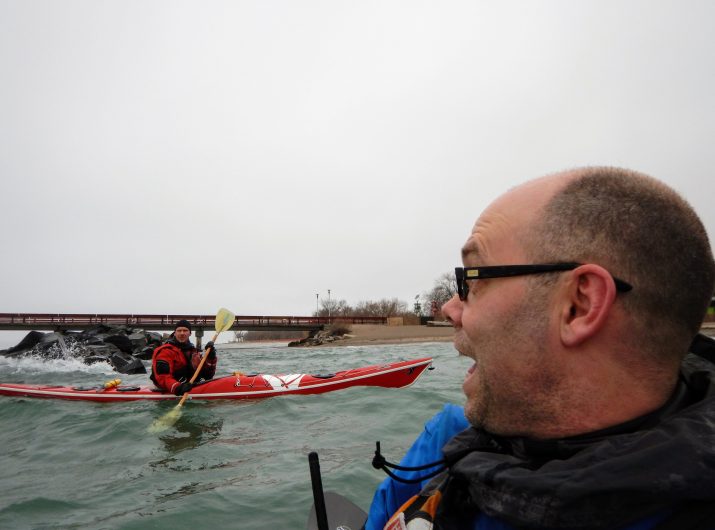You just finished up your first kayaking course and you now need to talk to your students and let them know how they did. Help! What do I do? Tim Dyer from White Squall has posted some great tips to help you get through what some argue as one of the most important part of any kayaking course – the final debrief.
As an instructor, the debriefing process is probably one of the most important parts of the teaching process. It wraps up the course and provides the student directed feedback on what they have successfully accomplished and things to work on after the course.
Quick Tips:
- Make specific notes in consultation with fellow instructors prior, and ensure you all agree on every point.
- Take turns doing the debrief. It often helps if you are very familiar with a particular candidate to let the other instructor take the lead on the debrief.
- Establish a quiet place away from distractions.
- Avoid a physical setting which pits the candidate across from the participant in an artificial, imposing fashion, try to make it a collegial setting, because that is what we are trying to project and nurture.
- Let those who must travel furthest, or have some pressing need go first. You can do that simply by asking the group for what order is ok with them.
- At the beginning of the course, have a self evaluation tool for each student, and encourage them to use it throughout the course (this can be simply a list of required skills/theory with a checklist format. When it comes time to talk about their performance, have them identify for themselves exactly what they felt they did well, and not so well.
- Throughout the course, have specific time set aside each day to “check in” with entire group, so you can identify early if things are going wrong and remedy them.
- Throughout the course, also “check in” with each student, and let them know specifically if there are skills/theory areas that they need to improve and give them clear coaching. When it comes time to wrap up at the end, they should know already through self assessment and your on-going coaching, exactly where they are. There shouldn’t be any surprises.
- Candidates often forget what exactly was said in the emotion of the moment, so ensure you make each point very clear-and in a neutral tone and body language. If you are offering a conditional pass to the student, be explicit and have them documented.
- The hardest thing to learn in debriefing is to listen. You must listen to what the candidate is saying in the conversation and observe their body language, without imposing your own bias or thoughts over it. Often, they will identify themselves what needs to be done. By listening well, you will know whether your message to them has been received and understood and accepted! Some candidates need very detailed debriefing while others don’t. By listening to them, you’ll know.
- A key to good debriefing is the timing of when you identify and explain your assessment. If you do it too early, some candidates will shut down because all they want to hear was if they passed or failed. Everything you say after that will be hard for them to absorb. On the other hand, it’s painfully unfair to have an instructor go through an entire debrief and keep the candidate waiting in suspense to the very end. This is just power mongering. Be sensitive and listen to each person and try to establish for that individual when is the best time.
- Establish a timetable and keep to it. If you know more time is required, ask them to stay behind, or to communicate with you at another time.
- Debriefing is extremely taxing mentally if done well, yet it comes at the end of a physically and mentally challenging time, where all you want to do is just get the heck out of there. You must project a keen interest in each and every candidate, greet them at the start of the debrief, shake their hands at the end and demonstrate that you are glad they came to the course and that you wish them well in their paddling adventures. They all deserve equal time with you, and it will be abundantly clear, again by tone and body language, if you do not demonstrate full interest in that.
- Give the candidate opportunity to “de-brief” both the course and your instruction. Don’t be defensive-just listen.
- There is nothing worse than making a candidate hang around for hours after a course is finished for a 10 minute debrief. It is not fair on them, and completely unnecessary if you establish a reasonable schedule and stick to it.
- Remember that there other resources and support available to you. If a student isn’t happy with your decision, you can always refer them to their local board member or to contact the office.
Good debriefing technique is as much a learned skill as learning how to roll. When you are done, look back and think about what went well and what went not so well. What you have done differently next time? Talk to other instructors and find out what works for them. Good luck!
